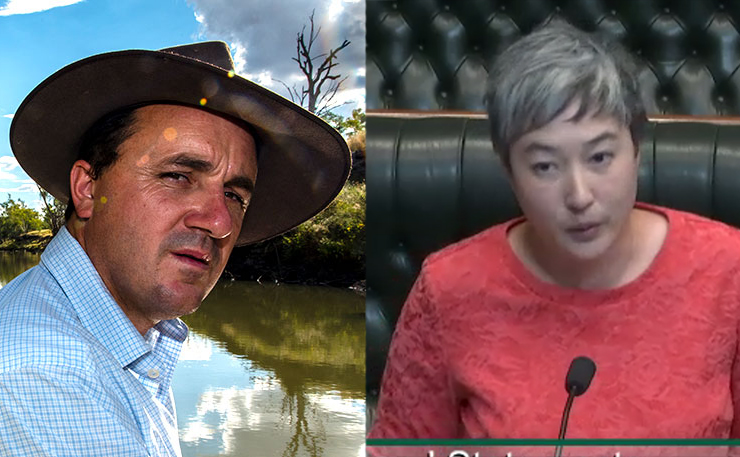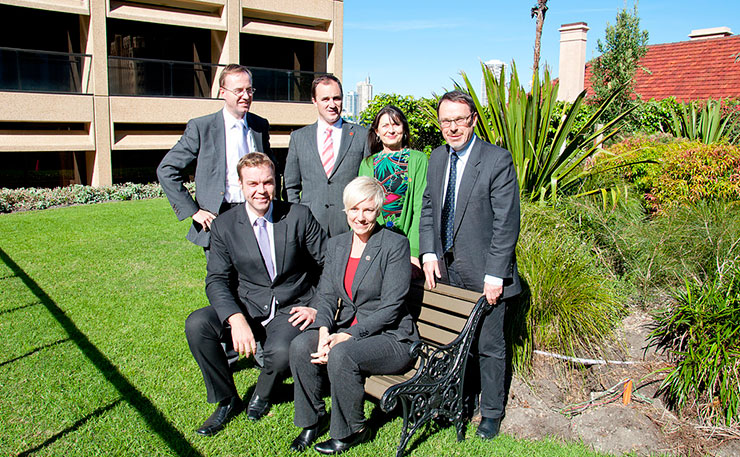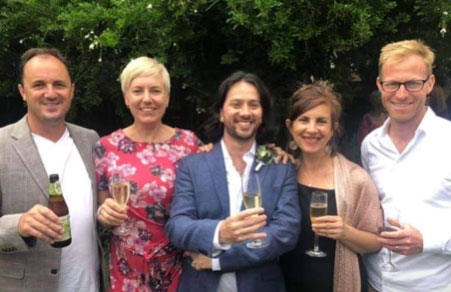The troubles for the embattled Greens NSW just got a whole lot worse, writes Michael Brull.
The wrecking campaign by the right faction of the Greens NSW has escalated. It appears the party is now headed for court, in a desperate bid to install state MLC Dawn Walker as the number two on the electoral ticket.
Incredibly, the effect of this move is to threaten that the Greens might not be able to lodge an upper house ticket for the NSW state election in March. Those are the stakes raised by the latest wrecking gambit by the right faction in the Greens. But first, let me explain how we got here.
The background
The background is basically as follows. In August last year, Jeremy Buckingham, the MLC who dominated the right faction of the Greens NSW, was accused on ABC of sexually harassing a staffer of another right-wing MP. The four MLCs of the NSW right – Buckingham, Walker, Cate Faehrmann, and Justin Field – discussed in August last year splitting from the party and founding a new one.
According to a document they circulated last year, they regarded the party as having an “ideological divide” between the ecological realists and the communists. A new party would have a “reinvigorated focus on environmental issues and campaigning”. In short, the right in the party regard their politics as climate first. They object to the leftist politics of their opponents.
The preselection conducted last year disappointed them. Faehrmann triumphed in the casual vacancy to succeed Mehreen Faruqi, now a federal Senator. This was relatively straightforward, given she has previously served as an MP, and had a much higher profile than her opponents.
However, in the preselection for the electoral ticket for this coming NSW election, the main contest was between Walker and Buckingham on the right, and Shoebridge and Boyd on the left and centre-left respectively. Shoebridge won by a significant margin.
The party’s affirmative action policy meant that the second spot had to go to a non-male candidate. Shoebridge had enough votes to win by hundreds of votes, which put Boyd well ahead of Walker.
Whilst the party has won three seats in a state election before, it’s a tough ask. The right was disappointed that in a single stroke, it would lose two MLCs – particularly given that Buckingham played a leading role in factional organising, and is probably their only MLC with an actual record of effective campaigning, or even of winning an election.
Due to the many, many issues raised by Buckingham’s response after the allegations of sexual assault were made on ABC, the party eventually reached consensus that Buckingham should go. In August, 65 percent of delegates of local groups across NSW voted in favour of Buckingham standing down during the investigation.
Buckingham’s response, such as his public insinuations about the complainant, were so egregious that in the end, a consensus of local groups voted in favour of a resolution asking him to stand down from the electoral ticket. This consensus was aided by Buckingham issuing a media release to a journalist during the meeting where he claimed that the group had voted in his favour, apparently assuming that any subsequent votes would similarly go in his favour. Not a single group wound up blocking the resolution to support him.

After this, the right panicked. Buckingham subsequently resigned from the Greens, and Field and Faehrmann issued an ultimatum to the party, demanding that Buckingham’s preferences be re-distributed. As Walker had come last, and was factionally aligned with Buckingham, it was expected that this would result in her moving up the electoral ticket to number two. There was no precedent for such a move. Three precedents of people standing down from electoral tickets were produced – in every instance, the next on the ticket had moved up one spot.
The other demand by Field and Faehrmann was that two socialist groups be expelled and banned from the Greens. One, Solidarity, has less than two people in the Greens. The other is Left Renewal, which has 40-60 people. There are over 3,000 people in the party.
The claim that either group has any real influence on the party lacks credibility and is probably just cynical red-baiting to appeal to the corporate media as respectable moderates.
Neither demand was met. Not one local group across NSW embraced either – and this was after dozens agreed to request that Buckingham stand down. This was a pretty stark illustration of where the right MLCs stood. They had no ability to persuade most members of the party of their own factional agenda, and their steadfast support of Buckingham had simply left them isolated. They could hardly start their own party on this basis. Only a few hundred people signed their petition. If they split from the party, that would cause a significant drain of resources, but they would not take the brand, or the vast majority of members, activists and volunteers with them.
The coming election
Thus, an election approaches on March 23. Faehrmann and Field would like to see Buckingham elected, even if he isn’t in the party. He is still their ideological ally, and they are fundamentally on the same page, including in their criticisms of their factional opponents in the party. They have both gone out on a ledge, encouraging the public to disbelieve allegations against Buckingham.
When Greens lower house MLA Jenny Leong accused Buckingham of acting in an aggressive and intimidating way towards her on two occasions, Field dismissed this as “hearsay and innuendo”.
Faehrmann more broadly argued against #MeToo, writing, “The unrelenting attacks against Jeremy Buckingham have revealed a deeply troubling side to the campaign for women’s voices and experiences to be trusted when it comes to allegations of sexual assault and violence against them by men.”
Their position in the party is weak. The position of the left will be strengthened in this election, as it is expected that Shoebridge and Boyd will both be elected. Those upper house seats last for eight years. This is a lot to stomach for the right, as it has lost Buckingham from the party and probably parliament, and probably Walker will go too. Having decided splitting wasn’t a viable option, they have taken to wrecking instead.
As discussed in my previous article, much of this has been in the form of leaks to the media. This includes the leaking of a letter to the Greens to the Guardian, which demanded that the Committee of Management determine on its own – rather than deferring to the local groups to decide – that the preferences from Buckingham be redistributed.

One of the favoured sources has been Lisa Visentin from Fairfax. For example, she reported a story in early February that “hundreds of members of the NSW Greens have quit the party as ongoing factional battles eat away at party morale before the upcoming state and federal elections.” It was based on a leaked report by the membership officer from November.
The facts that Visentin included in her story completely undercut it. In November last year, there were 485 fewer members than in the previous year – a decline of about 13 percent. This is not news. When the party failed to act on the allegations against Buckingham, hundreds signed a petition expressing their dismay, and as the ABC reported, dozens “resign[ed]in disgust”. Lee Rhiannon wrote in October that 200 Young Greens had left, and Young Greens figures attributed this to anger at the inaction on Buckingham.
That’s what happened up to November. In December, Buckingham left. He openly tried to recruit people from the Greens to follow him out. How did that go? According to Visentin, the membership grew by 93 people from November to January. That is, there was an exodus when the party failed to act on Buckingham. When he left, and took some of his followers with him, the party membership grew. Somehow, Visentin looked at these figures and concluded it was a sign of “ongoing factional battles eat[ing]away at party morale”, rather than party morale stabilising and even improving once Buckingham had left.
The legal threat
Aside from attacks and leaks to the media, there are now more legal threats on the table. It goes as follows. Walker, and her allies on the right, want Buckingham’s preferences redistributed. There is no precedent for this, and it has little support. At a meeting where local delegates decide party matters, there was a vote on whether the proposal should be substantively discussed. It failed. Thus, a media campaign followed, with leaks to the Guardian, Fairfax, and Saturday Paper, all arguing for the preference redistribution as the only democratic thing to do.
In February, there was another meeting of delegates of local groups around the state. In the lead-up, members repeatedly complained they were getting spammed about this proposal. People who had not agreed to give their email to Walker or her camp found they received unsolicited emails from Chris Harris, Carol Vernon, and “Greens NSW Member”. Members became alarmed and frustrated, wondering how their personal details had been harvested in this way, and what it meant for their privacy.
It was hard to guess the endgame for this. The preferences were not going to be redistributed, because it did not have popular support. The emails just became another grievance. And the media campaign didn’t go down well either. It was understandable that Buckingham, Field and Faehrmann would sabotage the election campaign of the left in the party. But Walker was essentially sabotaging her own chances of getting re-elected. If she was going to split, why not split back in December with Buckingham?
In any event, the February meeting of delegates came. It was clear that Walker’s proposal was not going to get popular support, so it was withdrawn before it could even be tested. Local groups were shocked – after all the acrimonious discussion around this controversial issue, now they wouldn’t even be allowed to vote on it? It was withdrawn with the explanation that legal action was on the way. Rather than permitting a vote on the issue, Walker or her camp were going to take the party to court.
It is hard to imagine she’ll be successful. There is no precedent for what she is demanding, and she has refused to pursue open avenues in the party for what she wants. She opposes a vote of the Local Groups on her proposal, and has turned to the courts to impose it on the party – naturally, in the name of democracy.
The two people who will be the face of the legal action – if it happens – are Chris Harris and Lindsay Johnston. Taking the party to court on Walker’s behalf is a bold move. Yet the stakes should be underlined further.
The deadline for lodging nominations for the state election are noon on March 6. That is the cut-off for an electoral ticket.

Nominations opened on Monday February 25. As the forms are complex, party officials have said “Errors are inevitable”. Any errors mean those forms need to be resubmitted. Due to Walker’s obstructionism, those forms cannot yet be submitted. If the court case drags on – say, if an injunction is granted – then we could see the courts resolve the composition of the upper house ticket rather close to 6 March.
This drama could mean that the Greens fail to lodge an upper house ticket by the deadline. Losing two more upper house MLCs because of obstructionism by Walker and her supporters would be staggering. And it is a legitimate threat at this point.
In the lead-up to the February gathering, a campaign committee issued a shrewd proposal. It provides that all upper house candidates must submit their nomination forms by 6pm on 28 February. A candidate who fails to do so will be assumed to have withdrawn their candidacy. The remaining candidates would therefore be moved up the ticket.
Thus, the party is facing quite the showdown. If the legal case goes ahead, it could sabotage the entire upper house ticket of the party. If it fails, and Walker has not submitted to her spot as third on the ticket, then she could be disqualified by failing to get her form in by the 28th.
If she decides against the legal action, then the party will be in the strange position of campaigning for someone who has threatened to split from the party, and who at time of writing is threatening to sue the party and indirectly threatening to sabotage the entire upper house ticket.
I don’t think I’ve ever heard of a more incredible story of internal wrecking in a political party. So far, the Guardian and Fairfax have blandly reported on the party being sued, less than a month before the election. They have not drawn any conclusions about what kind of politician decides their political career is worth damaging their own party in this way.
We’ll watch, and wait.
Ed’s note: Shortly after publication of this article, the Greens released the following statement.
Rochelle Flood, Co Convenor for The Greens NSW said: “These legal proceedings are a last-ditch attempt by two Greens members to derail the party’s ticket and its election campaign.
These individuals have had ample opportunity, over several months, to put the case for a recount.
They had an opportunity to take a proposal to last weekend’s State Delegates Council (SDC), but declined to do so.
They could have launched legal proceedings at any time since last year. Instead, they have waited until the stroke of midnight, with nominations to the electoral commission already open and due in a matter of days.
We can only conclude that this is simply an attempt to wreck the party’s campaign, and Greens NSW will defend the action in court.
The time, money and energy spent on this would have been better devoted to throwing out this dreadful government.
The Greens NSW will defend the action in court.”
* Michael Brull has been a member of the NSW Greens for about 18 months. He leans towards the left of the party. He does not hold any formal role in the party, nor has he ever performed any paid role.
Donate To New Matilda
New Matilda is a small, independent media outlet. We survive through reader contributions, and never losing a lawsuit. If you got something from this article, giving something back helps us to continue speaking truth to power. Every little bit counts.




